- Home
- W. Somerset Maugham
On a Chinese Screen Page 8
On a Chinese Screen Read online
Page 8
The consul had never heard anything so outrageous. It really was the last straw. And now while he strode along, trying to walk off his anger, though he was not a man who often used bad language he really could not restrain himself, and he said fiercely:
"Women are simply bloody."
XXXI
THE STRIPLING
HE walked along the causeway with an easy confident stride. He was seventeen, tall and slim, with a smooth and yellow skin that had never known a razor. His eyes, but slightly aslant, were large and open and his full red lips were tremulous with a smile. The happy audacity of youth was in his bearing. His little round cap was set jauntily on his head, his black gown was girt about his loins, and his trousers, as a rule gartered at the ankle, were turned up to the knees. He went barefoot but for thin straw sandals, and his feet were small and shapely. He had walked since early morning along the paved causeway that wound its sinuous path up the hills and down into the valleys with their innumerable padi fields, past burial grounds with their serried dead, through busy villages where maybe his eyes rested approvingly for a moment on some pretty girl in her blue smock and her short blue trousers, sitting in an open doorway (but I think his glance claimed admiration rather than gave it), and now he was nearing the end of his journey and the city whither he was bound seeking his fortune. It stood in the midst of a fertile plain, surrounded by a crenellated wall, and when he saw it he stepped forward with resolution. He threw back his head boldly. He was proud of his strength. All his worldly goods were wrapped up in a parcel of blue cotton which he carried over his shoulder.
Now Dick Whittington, setting out to win fame and fortune, had a cat for his companion, but the Chinese carried with him a round cage with red bars, which he held with a peculiar grace between finger and thumb, and in the cage was a beautiful green parrot.
XXXII
THE FANNINGS
THEY lived in a fine square house, with a verandah all round it, on the top of a low hill that faced the river, and below them, a little to the right, was another fine square house which was the customs; and to this, for he was deputy commissioner, Fanning went every day. The city was five miles away and on the river bank was nothing but a small village which had sprung up to provide the crews of junks with what gear or food they needed. In the city were a few missionaries but these they saw seldom and the only foreigners in the village besides themselves were the tide-waiters. One of these had been an able seaman and the other was an Italian; they both had Chinese wives. The Fannings asked them to tiffin on Christmas day and on the King's Birthday; but otherwise their relations with them were purely official. The steamers stayed but half an hour, so they never saw the captains or the chief engineers who were the only white men on them, and for five months in the year the water was too low for steamers to pass. Oddly enough it was then they saw most foreigners, for it happened now and again that a traveller, a merchant or consular official perhaps, more often a missionary, going up stream by junk, tied up for the night, and then the commissioner went down to the river and asked him to dine. They lived very much alone.
Fanning was extremely bald, a short, thickset man, with a snub nose and a very black moustache. He was a martinet, aggressive, brusque, with a bullying manner; and he never spoke to a Chinese without raising his voice to a tone of rasping command. Though he spoke fluent Chinese, when one of his "boys" did something to displease him he abused him roundly in English. He made a disagreeable impression on you till you discovered that his aggressiveness was merely an armour put on to conceal a painful shyness. It was a triumph of his will over his disposition. His gruffness was an almost absurd attempt to persuade those with whom he came in contact that he was not frightened of them. You felt that no one was more surprised than himself that he was taken seriously. He was like those little grotesque figures that children blow out like balloons and you had an idea that he went in lively fear of bursting and then everyone would see that he was but a hollow bladder. It was his wife who was constantly alert to persuade him that he was a man of iron and when the explosion was over she would say to him :
"You know, you frighten me when you get in those passions," or "I think I'd better say something to the boy, he's quite shaken by what you said."
Then Fanning would puff himself up and smile indulgently. When a visitor came she would say :
"The Chinese are terrified of my husband, but of course they respect him. They know it's no good trying any of their nonsense with him."
"Well, I ought to know how to treat them," he would answer with beetling brows, "I've been over twenty years in the country."
Mrs. Fanning was a little plain woman, wizened like a crab-apple, with a big nose and bad teeth. She was always very untidy, her hair, going a little grey, was continually on the point of falling down. Now and then, in the midst of conversation, she would abstractedly take out a pin or two, give it a shake, and without troubling to look in the glass insecurely fix its few thin wisps. She had a love of brilliant colour and she wore fantastic clothes which she and the sewing amah ran up together from the fashion papers; but when she dressed she could never find anything that went with anything else and she looked like a woman who had been rescued from shipwreck and clothed in any oddments that could be found. She was a caricature, and you could not help smiling when you looked at her. The only attractive thing she had was a soft and extremely musical voice and she spoke with a little drawl which came from I know not what part of England. The Fannings had two sons, one of nine and one of seven, and they completed the solitary household. They were attractive children, affectionate and demonstrative, and it was pleasant to see how united the family was. They had little jokes together that amused them hugely, and they played pranks with one another as though not one of them was more than ten. Though they had so much of one another's society it really looked as though they could not bear to be out of one another's sight, and each day when Fanning went to his office his boys would hardly let him go and each day when he returned they greeted him with extravagant delight. They had no fear of his gruff bluster.
And presently you discovered that the centre of this concord was that little, grotesque, ugly woman; it was not chance that kept the family united, nor peculiarly agreeable dispositions, but a passion of love in her. From the moment she got up in the morning till the time she went to bed her thoughts were occupied with the welfare of the three male persons who were in her charge. Her active mind was busy all the time with schemes for their happiness. I do not think a thought of self ever entered her untidy head. She was a miracle of unselfishness. It was really hardly human. She never had a hard word for anyone. She was very hospitable and it was she who caused her husband to go down to the houseboats and invite travellers to come up to dinner. But I do not think she wanted them for her own sake. She was quite happy in her solitude, but she thought her husband enjoyed a talk with strangers.
"I don't want him to get in a rut," she said. "My poor husband, he misses his billiards and his bridge. It's very hard for a man to have no one to talk to but a woman."
Every evening when the children had been put to bed they played piquet. She had no head for cards, poor dear, and she always made mistakes, but when her husband upbraided her, she said :
"You can't expect everyone to be as clever as you are."
And because she so obviously meant what she said he could not find it in his heart to be angry with her. Then when the commissioner was tired of beating her they would turn on the gramophone and sitting side by side listen in silence to the latest songs from the musical comedies of London. You may turn up your nose. They lived ten thousand miles away from England and it was their only tie with the home they loved: it made them feel not quite so utterly cut off from civilisation. And presently they would talk of what they would do with the children when they grew up; soon it would be time to send them home to school and perhaps a pang passed through the little woman's gentle heart.
"It'll be hard for you, Bertie, when they go,
" she said. "But perhaps we shall be moved then to some place where there's a club and then you'll be able to go and play bridge in the evenings."
XXXIII
THE SONG OF THE RIVER
YOU hear it all along the river. You hear it, loud and strong, from the rowers as they urge the junk with its high stern, the mast lashed alongside, down the swift running stream. You hear it from the trackers, a more breathless chaunt, as they pull desperately against the current, half a dozen of them perhaps if they are taking up a wupan, a couple of hundred if they are hauling a splendid junk, its square sail set, over a rapid. On the junk a man stands amidships beating a drum incessantly to guide their efforts, and they pull with all their strength, like men possessed, bent double; and sometimes in the extremity of their travail they crawl on the ground, on all fours, like the beasts of the field. They strain, strain fiercely, against the pitiless might of the stream. The leader goes up and down the line and when he sees one who is not putting all his will into the task he brings down his split bamboo on the naked back. Each one must do his utmost or the labour of all is vain. And still they sing a vehement, eager chaunt, the chaunt of the turbulent waters. I do not know how words can describe what there is in it of effort. It serves to express the straining heart, the breaking muscles, and at the same time the indomitable spirit of man which overcomes the pitiless force of nature. Though the rope may part and the great junk swing back, in the end the rapid will be passed; and at the close of the weary day there is the hearty meal and perhaps the opium pipe with its dreams of ease. But the most agonising song is the song of the coolies who bring the great bales from the junk up the steep steps to the town wall. Up and down they go, endlessly, and endless as their toil rises their rhythmic cry. He, aw -- ah, oh. They are barefoot and naked to the waist. The sweat pours down their faces and their song is a groan of pain. It is a sigh of despair. It is heart-rending. It is hardly human. It is the cry of souls in infinite distress, only just musical, and that last note is the ultimate sob of humanity. Life is too hard, too cruel, and this is the final despairing protest. That is the song of the river.
XXXIV
MIRAGE
HE is a tall man with bulging, sky blue eyes and an embarrassed manner. He looks as though he were a little too large for his skin and you feel that he would be more comfortable if it were a trifle looser. His hair, very smooth and crisp, fits so tightly on his head that it gives you the impression of a wig, and you have an almost irresistible inclination to pull it. He has no small talk. He hunts for topics of conversation and, racking his brain to no purpose, in desperation offers you a whisky and soda.
He is in charge of the B. A. T., and the building in which he lives is office, godown, and residence all in one. His parlour is furnished with a suite of dingy upholstered furniture placed neatly round the walls, and in the middle is a round table. A hanging petroleum lamp gives a melancholy light, and an oil stove heat. In appropriate places are richly framed oleographs from the Christmas numbers of American magazines. But he does not sit in this room. He spends his leisure in his bedroom. In America he has always lived in a boarding house where his bedroom was the only privacy he knew, and he has gotten the habit of living in one. It seems unnatural to him to sit in a sittingroom; he does not like to take his coat off, and he only feels at home in shirt sleeves. He keeps his books and his private papers in his bedroom; he has a desk and a rocking chair there.
He has lived in China for five years, but he knows no Chinese and takes no interest in the race among whom in all likelihood the best years of his life will be spent. His business is done through an interpreter and his house is managed by a boy. Now and then he takes a journey of several hundred miles into Mongolia, a wild and rugged country, either in Chinese carts or on ponies; and he sleeps at the wayside inns where congregate merchants, drovers, herdsmen, men at arms, ruffians, and wild fellows. The people of the land are turbulent; when there is unrest he is exposed to not a little risk. But these are purely business undertakings. They bore him. He is always glad to get back to his familiar bedroom at the B. A. T. For he is a great reader. He reads nothing but American magazines and the number of those he has sent to him by every mail is amazing. He never throws them away and there are piles of them all over the house. The city in which he lives is the gateway into China from Mongolia. There dwell the teeming Chinese, and through its gates pass constantly the Mongols with their caravans of camels; endless processions of carts, drawn by oxen, which have brought hides from the illimitable distances of Asia rumble noisily through its crowded streets. He is bored. It has never occurred to him that he lives a life in which the possibility of adventure is at his doors. He can only recognise it through the printed page; and it needs a story of derringdo in Texas or Nevada, of hairbreadth escape in the South Seas, to stir his blood.
XXXV
THE STRANGER
IT was a comfort in that sweltering heat to get out of the city. The missionary stepped out of the launch in which he had dropped leisurely down the river and comfortably settled himself in the chair which was waiting for him at the water's edge. He was carried through the village by the river side and began to ascend the hill. It was an hour's journey along a pathway of broad stone steps, under fir trees, and now and again you caught a delightful glimpse of the broad river shining in the sun amid the exultant green of the padi fields. The bearers went along with a swinging stride. The sweat on their backs shone. It was a sacred mountain with a Buddhist monastery on the top of it, and on the way up there were rest houses where the coolies set down the chair for a few minutes and a monk in his grey robe gave you a cup of flowered tea. The air was fresh and sweet. The pleasure of that lazy journey -- the swing of the chair was very soothing -- made a day in the city almost worth while; and at the end of it was his trim little bungalow where he spent the summer, and before him the sweet-scented night. The mail had come in that day and he was bringing on letters and papers. There were four numbers of the Saturday Evenmg Post and four of the Literary Digest. He had nothing but pleasant things to look forward to and the usual peace (a peace, as he often said, which passeth all understanding), which filled him whenever he was among these green trees, away from the teeming city, should long since have descended upon him.
But he was harassed. He had had that day an unfortunate encounter and he was unable, trivial as it was, to put it out of his mind. It was on this account that his face bore a somewhat peevish expression. It was a thin and sensitive face, almost ascetic, with regular features and intelligent eyes. He was very long and thin, with the spindly legs of a grasshopper, and as he sat in his chair swaying a little with the motion of his bearers he reminded you, somewhat grotesquely, of a faded lily. A gentle creature. He could never have hurt a fly.
He had run across Dr. Saunders in one of the streets of the city. Dr. Saunders was a little grey-haired man, with a high colour and a snub nose which gave him a strangely impudent expression. He had a large sensual mouth and when he laughed, which he did very often, he showed decayed and discoloured teeth; when he laughed his little blue eyes wrinkled in a curious fashion and then he looked the very picture of malice. There was something 'faunlike in him. His movements were quick and unexpected. He walked with a rapid trip as though he were always in a hurry. He was a doctor who lived in the heart of the city among the Chinese. He was not on the register, but someone had made it his business to find out that he had been duly qualified; he had been struck off, but for what crime, whether social or purely professional, none know; nor how he had happened to come to the East and eventually settle on the China coast. But it was evident that he was a very clever doctor and the Chinese had great faith in him. He avoided the foreigners and rather disagreeable stories were circulated about him. Everyone knew him to say how do you do to, but no one asked him to his house nor visited him in his own.
When they had met that afternoon Dr. Saunders had exclaimed:
"What on earth has brought you to the city at this time of year?"
"There was a stranger here the other day asking for you," said the doctor.
"For me?" cried the other with surprise.
"Well, not for you particularly," explained the doctor. "He wanted to know the way to the American Mission. I told him; but I said he wouldn't find anyone there. He seemed rather surprised at that, so I told him that you all went up to the hills in May and didn't come back till September."
"A foreigner?" asked the missionary, still wondering who the stranger could be.
"Oh, yes, certainly." The doctor's eyes twinkled. "Then he asked me about the other missions; I told him the London Mission had a settlement here, but it wasn't the least use going there as all the missionaries were away in the hills. After all it's devilish hot in the city. 'Then I'd like to go to one of the mission schools,' said the stranger. 'Oh, they're all closed,' I said. 'Well, then I'll go to the hospital.' 'That's well worth a visit,' I said, 'the American hospital is equipped with all the latest contrivances. Their operating theatre is perfect.' 'What is the name of the doctor in charge?' 'Oh, he's up in the hills.' 'But what about the sick?' 'There are no sick between May and September,' I said, 'and if there are they have to put up with the native dispensers.' "
Dr. Saunders paused for a moment. The missionary looked ever so slightly vexed.
"Well?" he said.
"The stranger looked at me irresolutely for a moment or two. 'I wanted to see something of the missions before I left,' he said. 'You might try the Roman Catholics,' I said, 'they're here all the year round.' 'When do they take their holidays then?' he asked. 'They don't,' I said. He left me at that. I think he went to the Spanish convent."
The missionary fell into the trap and it irritated him to think how ingenuously he had done so. He ought to have seen what was coming.

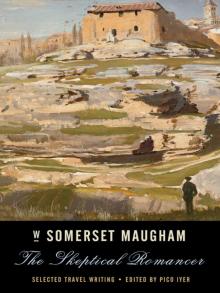 The Skeptical Romancer: Selected Travel Writing
The Skeptical Romancer: Selected Travel Writing The Summing Up
The Summing Up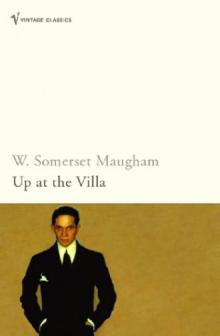 Up at the Villa
Up at the Villa The Razor's Edge
The Razor's Edge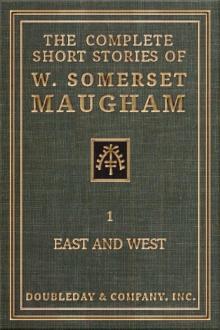 The Complete Short Stories of W. Somerset Maugham: East and West (Vol. 1 of 2))
The Complete Short Stories of W. Somerset Maugham: East and West (Vol. 1 of 2))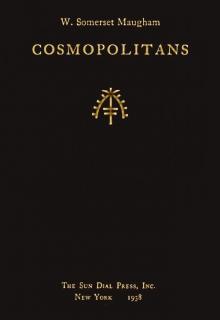 Cosmopolitans
Cosmopolitans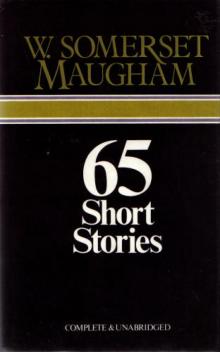 65 Short Stories
65 Short Stories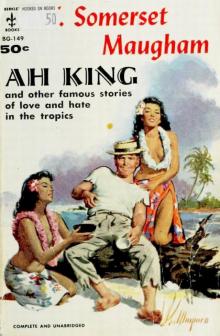 Ah King (Works of W. Somerset Maugham)
Ah King (Works of W. Somerset Maugham) Collected Short Stories: Volume 1
Collected Short Stories: Volume 1 Collected Short Stories Volume 2
Collected Short Stories Volume 2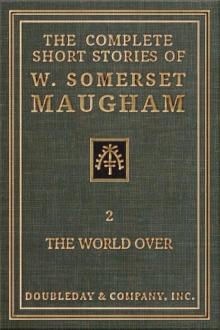 The Complete Short Stories of W. Somerset Maugham - II - The World Over
The Complete Short Stories of W. Somerset Maugham - II - The World Over Collected Short Stories Volume 4
Collected Short Stories Volume 4 Theatre
Theatre Short Stories
Short Stories Then and Now
Then and Now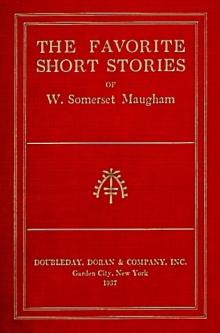 The Favorite Short Stories of W. Somerset Maugham
The Favorite Short Stories of W. Somerset Maugham Of Human Bondage
Of Human Bondage The Magician
The Magician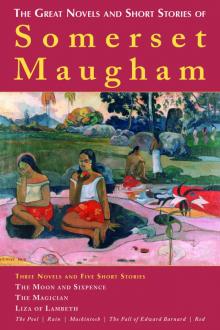 The Great Exotic Novels and Short Stories of Somerset Maugham
The Great Exotic Novels and Short Stories of Somerset Maugham A Writer's Notebook
A Writer's Notebook Christmas Holiday
Christmas Holiday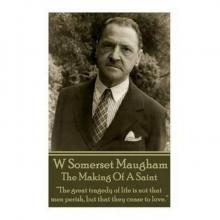 The Making of a Saint
The Making of a Saint Merry Go Round
Merry Go Round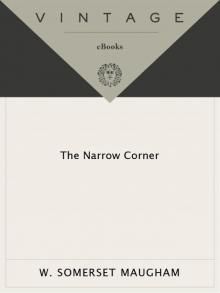 The Narrow Corner
The Narrow Corner Collected Short Stories Volume 3
Collected Short Stories Volume 3 Ten Novels and Their Authors
Ten Novels and Their Authors Ashenden
Ashenden The Moon and Sixpence
The Moon and Sixpence Cakes and Ale
Cakes and Ale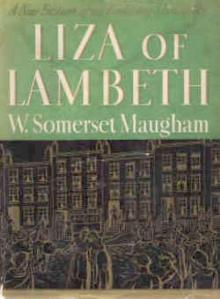 Liza of Lambeth
Liza of Lambeth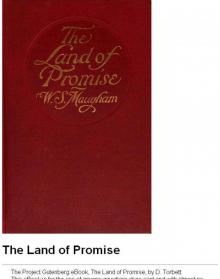 The Land of Promise: A Comedy in Four Acts (1922)
The Land of Promise: A Comedy in Four Acts (1922) A Writer's Notebook (Vintage International)
A Writer's Notebook (Vintage International)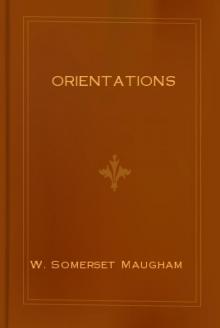 Orientations
Orientations Selected Masterpieces
Selected Masterpieces Mrs Craddock
Mrs Craddock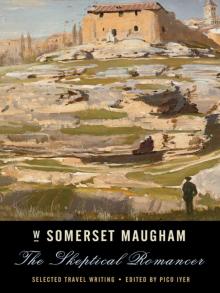 The Skeptical Romancer
The Skeptical Romancer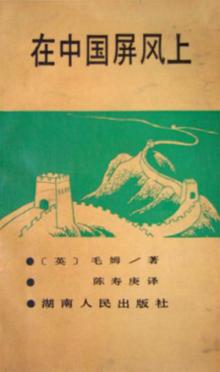 On a Chinese Screen
On a Chinese Screen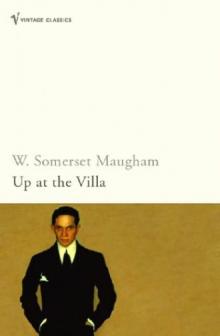 (1941) Up at the Villa
(1941) Up at the Villa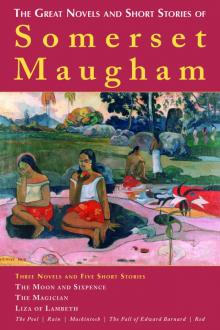 The Great Novels and Short Stories of Somerset Maugham
The Great Novels and Short Stories of Somerset Maugham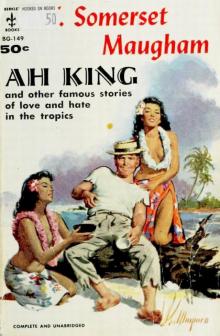 Ah King
Ah King The Explorer
The Explorer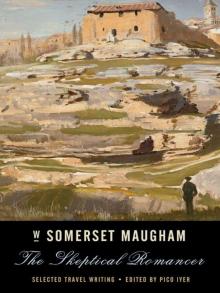 The Skeptical Romancer: Selected Travel Writing (Vintage Departures)
The Skeptical Romancer: Selected Travel Writing (Vintage Departures)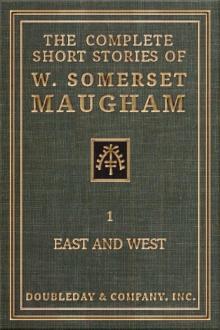 The Complete Short Stories of W. Somerset Maugham - I - East and West
The Complete Short Stories of W. Somerset Maugham - I - East and West